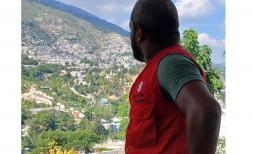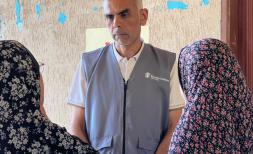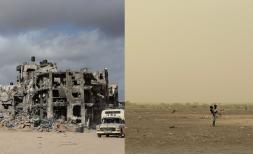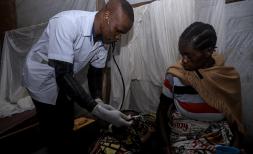Healthcare Inequalities and the challenges for Children in Colombia
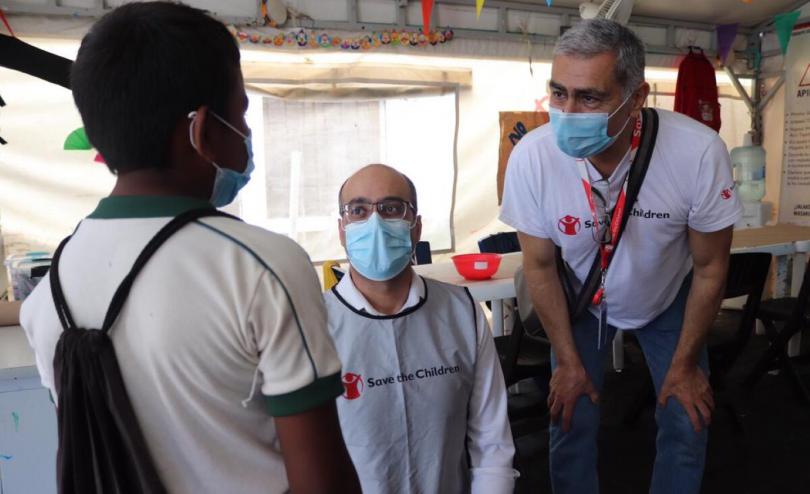
Zaeem at a Child-Friendly Space at the Paraguachón border crossing between Colombia/Venezuela. Zaeem talks to young unaccompanied children who spend the day at our Child-Friendly Space, learning, playing, being fed nutritious food and receiving healthcare.
Colombia has some of the best hospitals, health workers and healthcare facilities across Latin America, offering high-quality medical services to those who can afford them.
However, inequality in Colombia is also among the highest in Latin America. A significant proportion of the population including impoverished and displaced communities, indigenous people, migrants and refugees, lack access to even basic healthcare services.
Last year I visited our teams in Colombia to learn more about the challenges facing children and families there. It was my first visit to Latin America and despite having read about widespread inequalities; I could not have anticipated the conspicuous coexistence of sheer affluence and deprivation across the country.
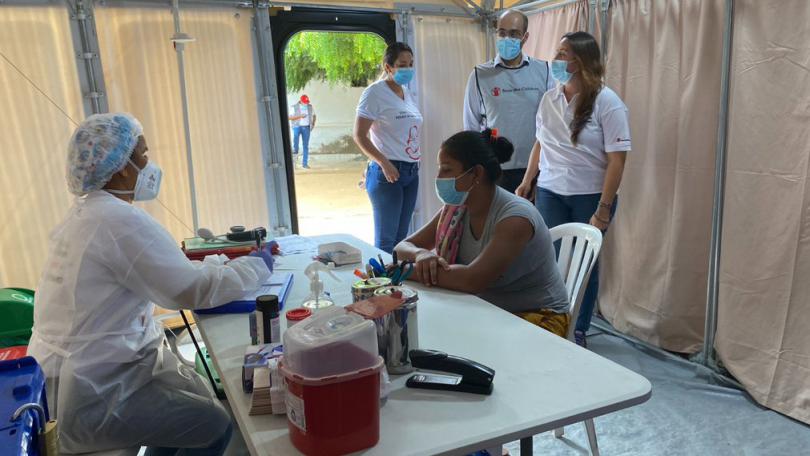
At the mobile clinic in Manaure, La Guajira, where Save the Children doctors and medical staff provide high-quality medical services for migrant and refugee mothers, newborns and children, including ante-natal care, post-natal care, and counselling on infant and young child feeding.
For children and their families, decades of conflict have meant Colombia has some of the highest numbers of internally displaced people in the world – now at 7.7 million. Displaced communities face a myriad of challenges related to lack of shelter, food and livelihoods, conflict-related violence, trauma and mental health issues, and lack of identification documents or enrolment in the social security system.
Indigenous people in Colombia are faced with a host of challenges that contribute to health inequity, including limited access to healthcare services and insufficient health awareness leading to inadequate behaviours and practices. This results in a higher prevalence of conditions and diseases such as malnutrition, malaria and tuberculosis, according to recent research.
Migrants and refugees represent yet another vulnerable group lacking access to basic services in Colombia. According to UN estimates, nearly 2 million Venezuelans reside in the country. This includes families as well as unaccompanied children, girls and women, who have crossed the border in search of food, safety and shelter in Colombia.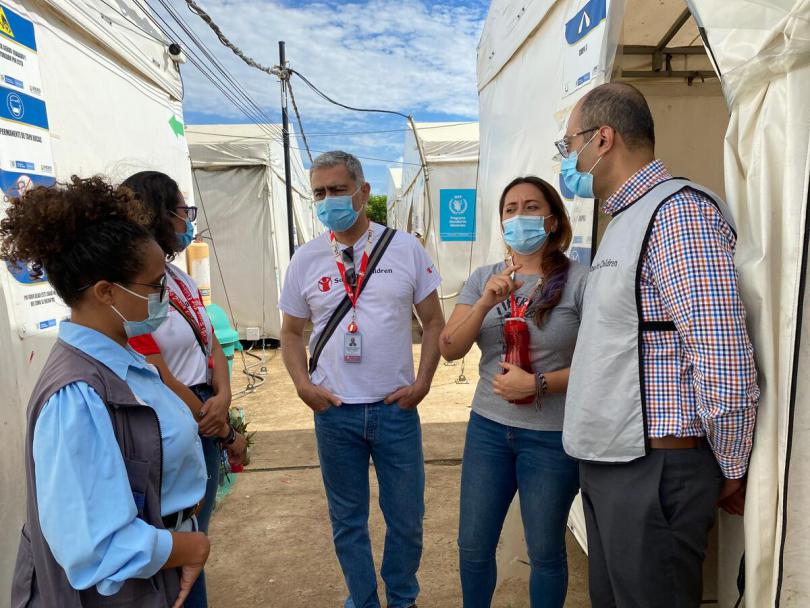
Zaeem at our mobile site at the refugee camp in Maicao. Located at the old airport and known locally as La Pista, this is one of the largest refugee camps in Latin America and our mobile teams visit this site to provide essential services to children and mothers. This includes health & nutrition, education and child protection.
In 2023, this cluster of needs across multiple vulnerable groups is compounded by ongoing conflict, climate change and a rise in natural disasters, the socio-economic crisis following the COVID-19 pandemic and the limited institutional capacity to serve the affected populations.
Access to healthcare for example is minimal in rural and remote areas where many of these marginalised groups reside. This is largely because there is a lack of adequate healthcare infrastructure, health workers, medical equipment and supplies in these areas.
So, what are we doing about it?
Save the Children has worked in Colombia since 1963, and over the past 60 years, we have championed the rights of all children in Colombia to survive, thrive, learn, live and grow up free from violence.
We provide high-quality healthcare services free of charge to the most marginalised and vulnerable groups, such as the migrant mothers and children across La Guajira, who would otherwise not have access to healthcare.
In my recent visit to our program in Colombia, I was impressed with the dedication and professionalism of our frontline staff delivering state-of-the-art healthcare at our clinic in Maicao as well as across multiple outreach sites around the province.
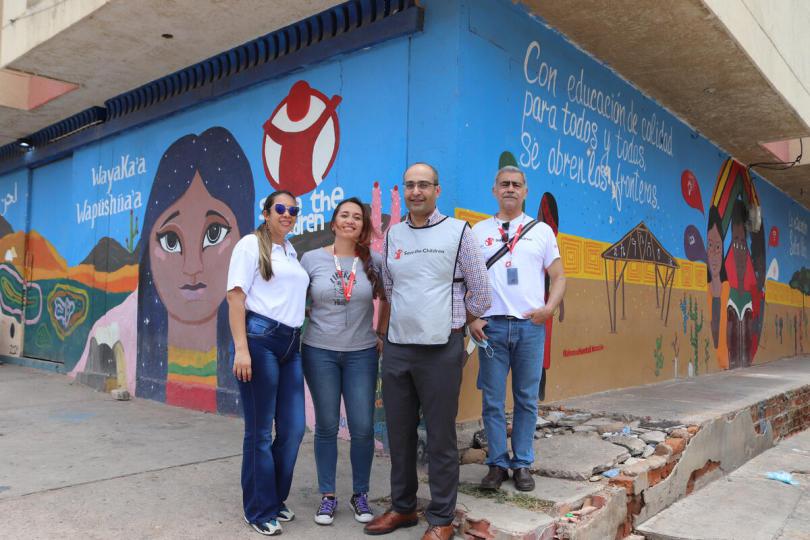
Zaeem with Save the Children Colombia colleagues – Dr Diana Pulido, Senior Health Lead in Colombia, Dr Luz Fernandez, Clinical Coordinator La Guajira province, and Dr Guillermo Navas, Director Programme Operations Colombia. Murals are part of Colombian culture/folklore and this Save the Children sponsored mural at the heart of Maicao town centre, carries messages around child rights and community cohesion, in three languages: Spanish, Arabic and Wayuunaiki (the language of the Wayuu indigenous people).
With 27% of the population living in poverty and 13% of children under five chronically under-nourished, we’re promoting health-seeking behaviours to help improve the uptake of ante-natal and maternity care, as well as appropriate feeding practices to reduce malnutrition among young children.
Save the Children is also working with local partners and community groups to promote access to specialised care, treat acute malnutrition and address socio-economic barriers and determinants of health.
Health inequity is a pervasive issue in Colombia that disproportionately affects marginalised groups and has been aggravated by the ongoing conflict, climate change, COVID pandemic and the economic crisis.
We’ll continue to champion the fundamental rights of vulnerable children and communities, ensure access to high-quality services for those in most need and work with partners to address the underlying systemic and policy issues to tackle health inequality in Colombia.
Your support will enable us to save even more lives.
